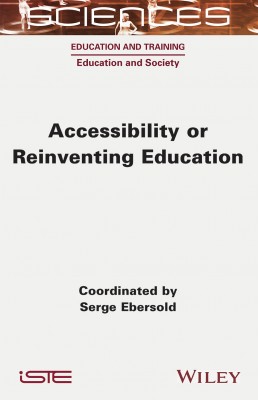
The accessibility requirement of educational policies is a reinvention of schools beyond the education of students with disabilities. Accessibility or Reinventing Education studies the changes that have redefined the roles and missions of schools, by asking them to consider the obstacles to learning imposed on students – regardless of their particular characteristics – in order to make themselves accessible to the greatest number.
This book examines the ways in which school stakeholders are addressing the need for accessibility to bring its principles to life on a daily basis. Particular attention is given to the strategies developed by teachers for creating accessible school environments, the conditions for mobilizing digital technologies, and the redefinition of relationships between teachers and their specialist counterparts.
Finally, the new figures of “ineducablility”, established because of the accessibility imperative, are considered, and a grammar of accessibility is proposed, setting the stage for accessibility in school environments and the implementation of inclusive policies.
Part 1. Accessibility as a Societal Imperative
1. The Accessibility Imperative: Outlines and Implications, Serge Ebersold.
2. Inclusion and Accessibility: 50 Years of Change, Peter Evans.
3. Accessibility Requirements and Evaluation Policies, Nathalie Mons.
Part 2. How Do Schools Meet the Accessibility Imperative?
4. Educational Accessibility: A Catalyst for Innovative Practices, Michele Mainardi.
5. School Form and Pedagogical and Didactic Accessibilization, Sylviane Feuilladieu, Anne Gombert and Hervé Benoit.
6. The Contribution of ICT to Accessible Learning Environments, Harald Weber.
7. The Reconfiguration of the Teaching Profession within the Dynamics of Accessibility, Éric Plaisance.
Part 3. Accessibility, or Reconfiguration of Academic Difficulties
8. Modes of Accessibilization and the Redefinition of Schooling in Accessibility, Daniel Frandji.
9. Externalized Teaching Units: A Tool for Making School Institutions More Accessible?, Hugo Dupont.
10. Social Figures of Allophony, Approaches to Accessibility and Social Inequalities, Maïtena Armagnague-Roucher.
11. The Grammar of Accessibility, Serge Ebersold.
Serge Ebersold is Professor at CNAM (Conservatoire National des Arts et Métiers), where he holds the Chair on accessibility. From an international perspective, his work links the issue of accessibility to changes in public action, focusing on policies, strategies and practices that lead to accessibility in school and social environments.